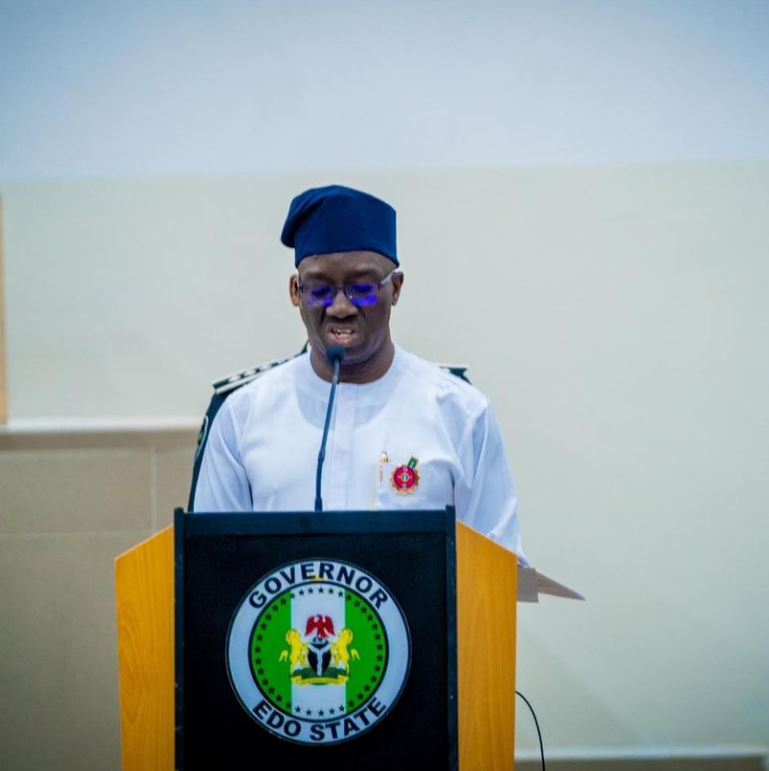Edo State Governor Monday Okpebholo announced a resolute commitment to combatting cultism, framing his efforts as a divinely ordained mission. Speaking at a special Thanksgiving mass held at St. Paul’s Catholic Church in Benin City, which coincided with Father’s Day and the second anniversary of Blessing Agbebaku’s tenure as Speaker of the Edo State House of Assembly, the governor emphasized that his fight against cultism transcends physical confrontations. He attributed his resolve to a spiritual calling, underscoring his gratitude for divine guidance in his leadership role.
Governor Okpebholo highlighted the severe socioeconomic toll of cult-related violence, estimating an annual loss of $1 billion to Edo State’s economy. He noted that the pervasive insecurity driven by cult activities discourages investors, stifles development, and disrupts community stability. By positioning cultism as a critical barrier to progress, the governor sought to rally public and institutional support for his administration’s aggressive anti-crime agenda.
The governor’s remarks were delivered during a well-attended event that blended religious observance with political significance. The Thanksgiving mass, organized to honor Speaker Agbebaku’s milestones, provided a platform for Okpebholo to articulate his vision for a safer Edo State. He praised the Speaker’s legislative leadership while tying his own governance to a broader moral and spiritual framework, appealing to the state’s predominantly Christian populace.
Okpebholo’s administration has already taken tangible steps to address cultism, including overseeing the demolition of properties linked to suspected criminals. These demolitions, conducted in collaboration with security agencies, aim to dismantle the infrastructure supporting illicit activities. The governor has publicly advocated for stringent measures against cultists, warning that his government will show no leniency to those undermining public safety.
Public reactions to Okpebholo’s stance have been mixed but largely supportive, particularly among residents frustrated by the persistent threat of cult violence. Community leaders and religious figures present at the mass expressed optimism about the governor’s resolve, citing his hands-on approach as a departure from previous administrations’ rhetoric-heavy strategies. However, some critics have called for greater transparency in the demolition operations to ensure innocent citizens are not unfairly targeted.
The governor’s emphasis on a divine mandate resonates deeply in Edo State, where faith-based narratives often influence public discourse. By framing his anti-cultism campaign as a spiritual battle, Okpebholo seeks to mobilize religious institutions as partners in his governance agenda. He referenced biblical principles of justice and stewardship during his speech, urging citizens to support his efforts through prayer and civic responsibility.
Cultism in Edo State has long been a complex issue, intertwined with youth unemployment, political patronage, and weak law enforcement. Secret societies, often operating under the guise of confraternities, have evolved into violent networks responsible for killings, extortion, and community terror. Okpebholo’s administration faces the challenge of addressing these root causes while delivering immediate security improvements.
Economic data cited by the governor underscores the urgency of his mission. The $1 billion annual loss attributed to cultism reflects disruptions in commerce, tourism, and foreign investment. Local businesses, particularly in Benin City, have repeatedly called for decisive action to restore confidence in the state’s economic environment.
Okpebholo’s anti-cultism campaign also aligns with broader national efforts to curb organized crime. The Nigerian Police Force and other security agencies have intensified operations against cult groups in the South-South region, with Edo State as a focal point. The governor’s collaboration with these agencies signals a coordinated approach, though challenges such as corruption and inadequate funding persist.
The Thanksgiving mass featured tributes to Speaker Agbebaku, whose legislative tenure has included efforts to strengthen laws against cultism. Agbebaku, in his remarks, pledged continued support for the governor’s security initiatives, emphasizing the Assembly’s role in passing enabling legislation. The synergy between the executive and legislative arms was a recurring theme, with both leaders projecting unity in tackling Edo’s challenges.
Religious leaders at the event reinforced Okpebholo’s message, urging congregants to reject cultism and embrace community vigilance. The Catholic Archbishop of Benin, who presided over the mass, commended the governor’s moral stance while calling for rehabilitation programs for repentant cultists. This dual approach—enforcement and redemption—reflects the multifaceted strategy Okpebholo aims to implement.
The governor’s personal involvement in anti-crime operations has bolstered his public image as a proactive leader. Reports indicate he has visited demolition sites and held strategy sessions with security chiefs, signaling a hands-on approach. These actions have earned him accolades from residents who view his visibility as a commitment to tangible results.
Despite the optimism, Okpebholo’s administration must navigate potential pitfalls. Critics warn that heavy-handed tactics, such as property demolitions, could alienate communities if not executed with precision. Human rights groups have urged the government to adhere to due process, citing past instances where innocent families suffered collateral damage in similar operations.
The governor’s reliance on religious rhetoric, while effective in mobilizing support, may also polarize segments of the population. Edo State’s diverse demographic includes non-Christians and secular groups who may prefer a more inclusive governance narrative. Balancing these dynamics will be crucial for Okpebholo’s long-term success.
Looking ahead, the governor has promised to unveil additional measures to combat cultism, including youth empowerment programs and community policing initiatives. These proposals aim to address the socioeconomic drivers of cult recruitment while enhancing grassroots security. Stakeholders are keenly awaiting details on funding and implementation timelines.




